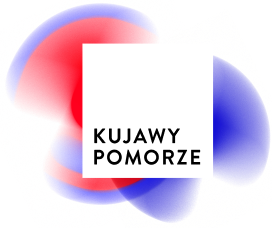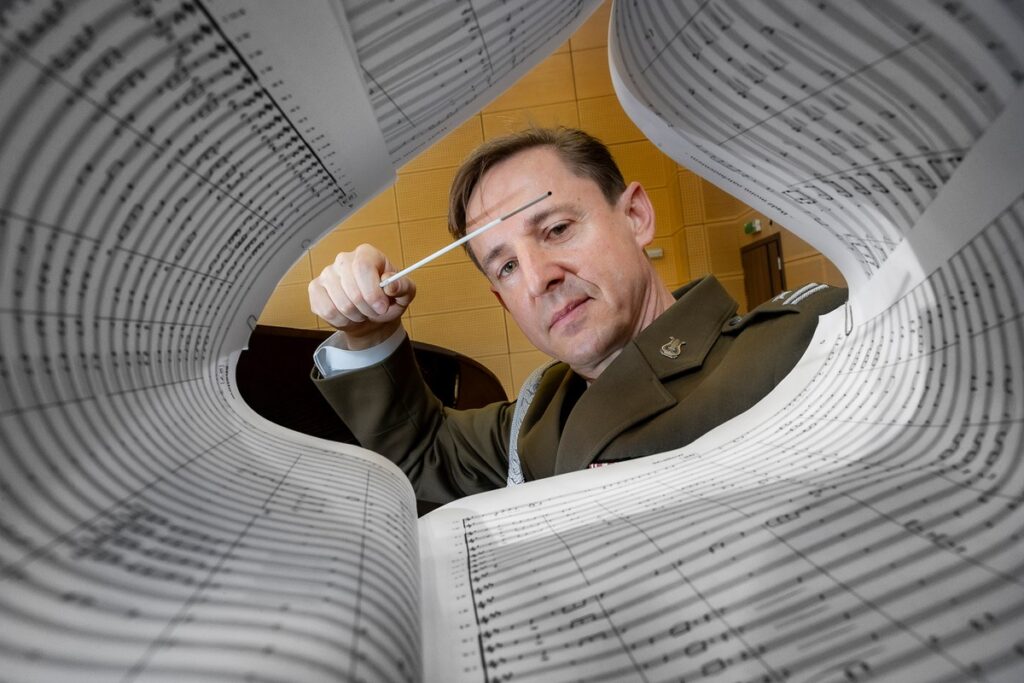
Baton and uniform
Interview with Dominik Sierzputowski, Conductor of the Bydgoszcz Military Orchestra
How did your adventure with music and the military begin?
My grandfather was captain of a research ship at Gdynia Maritime University, my dad served many years in the Navy, my sister is a tanker captain. So the uniform, like music, has accompanied me since childhood. At the age of 10, I began my education at a music school in clarinet class. I continued my education at the now defunct Military Music High School in Gdańsk, and after graduating I became a clarinetist with the Pomeranian Military District Representative Orchestra in Bydgoszcz. I started studies at the Faculty of Vocal and Acting at the Music Academy in Bydgoszcz in the solo singing class of Professor Maciej Witkiewicz. I made my debut on the stage of Opera Nova with the role of Morales in Georges Bizet’s opera ‘Carmen’ while still a fifth-year student at the then six-year university. I worked with the Bydgoszcz opera company for 20 years. This time was an opportunity for me to meet and observe excellent conductors Andrzej Straszyński, Andrzej Knap, Maciej Figas, Piotr Wajrak, Dirk Vermeulen (Germany), Henryk Wierzchoń. The performances they prepared, in which I participated, were an opportunity for me to observe their work. When I used to come to the rehearsals of the opera orchestra I used to marvel at its sound. It was then that I began to wonder whether opera music could be performed at a high artistic level with a wind ensemble.
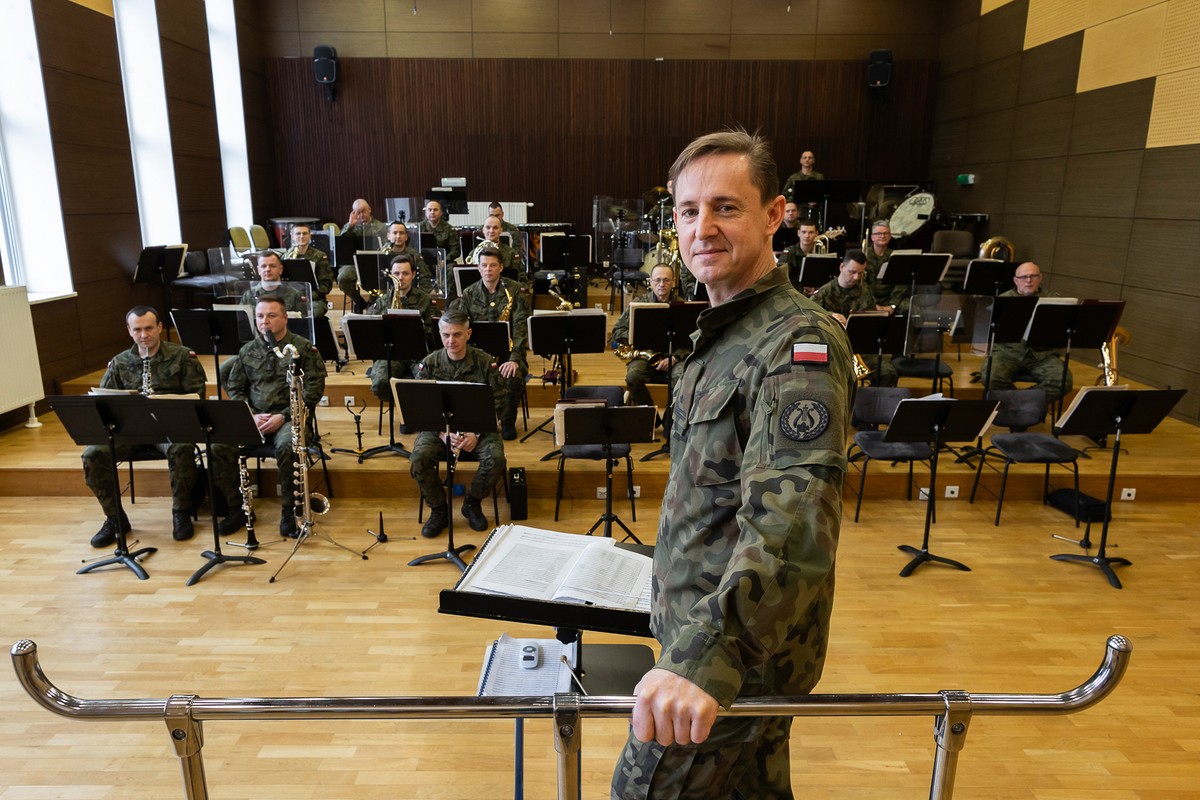
Dominik Sierzputowski fot. Tomasz Czachorowski/eventphoto.com.pl dla UMWKP
And this idea you decided to put into practice by directing individual orchestras?
Since 2005, as conductor and at the same time Commander of the Representative Orchestra of the Pomeranian Military District, I have had an influence on the selection of the concert repertoire. I tried, on the occasion of occasional concerts, to involve soloists from the Bydgoszcz opera and to present the audience with numerous transcriptions of songs and opera arias. As conductor and deputy commander of the Representative Orchestra of the Land Forces in Warsaw, together with the commander, Colonel Artur Czereszewski, we led to many recordings, including the ‘Warsaw Concerto’, ‘Music written with breath’ and many recordings from concerts in Poland and abroad. A particularly important project for me from that period was the ‘Concert of Nations’ at the Beethovenhalle in Bonn. At that time I had the pleasure of conducting a combined line-up of representative orchestras – the Polish Army and the German Armed Forces.
For six years you led the Military Orchestra in Toruń. What was that time like?
I fully decided on the choice of repertoire and the direction of its musical development. At that time I established cooperation with the Toruń Symphony Orchestra, the Pomeranian Philharmonic Orchestra and Opera Nova in Bydgoszcz. This cooperation resulted in numerous joint concerts, including: the final concert of the festival ‘Toruń, Music and Architecture Dances from Operas and Ballets’, the ‘University Concert’ and the ‘Oskar for Kolberg’. Given that the ensemble’s work can only materialise in the form of CDs, we have recorded several discs with the Toruń wind ensemble, including ‘Nie tylko marszowo’ and ‘Jesienna nuta.
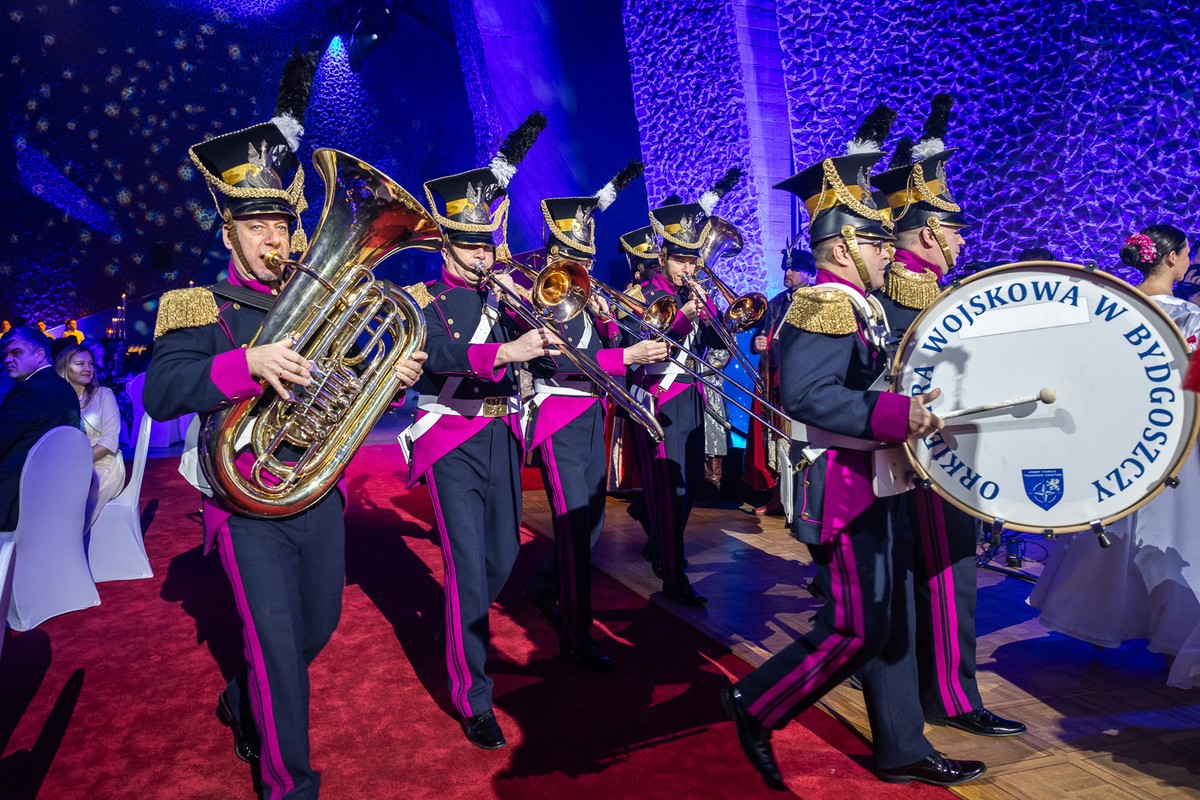
Orkiestra Wojskowa w Bydgoszczy na Marszałkowskim Balu Dobroczynnym fot. Szymon Zdziebło/tarantoga.pl dla UMWKP
You later moved to Bydgoszcz.
After receiving my doctoral degree in 2016, I became involved as a lecturer at the Academy of Music in Bydgoszcz, also taking up the position of conductor of the Polish Army Orchestra there. I returned to the Bydgoszcz orchestra after a twelve-year absence, richer in new experience. Shortly after taking up my duties in the new ensemble, I performed in a concert entitled ‘Piękna nasza Polska cała’, as part of the inauguration of the 54th Bydgoszcz Music Festival ‘Kontrasty – Wolność’.
With whom did you start your collaboration?
First of all, with the composer Roman Drozd. Our collaboration began in 2019 with the performance of an arrangement of Stanislaw Moniuszko’s works to mark the bicentenary of the composer’s birth. The next stage of our collaboration was the preparation of the work ‘Missa Vaticana – on the wings of love’, included in the musical form of a mass for male choir, soloists and wind orchestra. Initially, the composition was to be performed in Opera Nova by the orchestra led by me and the Lviv Municipal Choir ‘Homin’, specially invited to the project. The concert was cancelled due to the Covid-19 epidemic. I then decided to realise the project in the form of a film, which – combined with an exhibition of previously unpublished photographs by papal photographer Arturo Mari – was produced under the patronage of Popes Francis and Benedict XVI, as well as Marshal Piotr Całbecki. The film was broadcast on TVP Kultura 2.
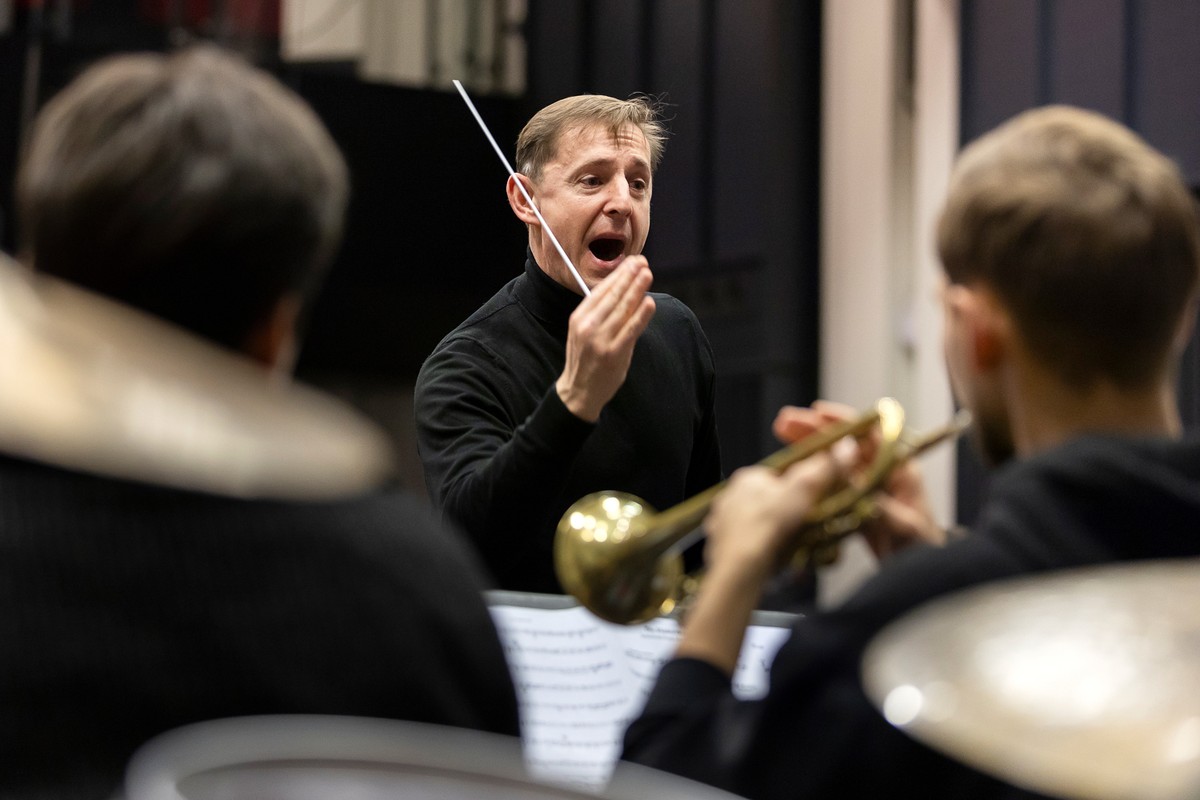
Dominik Sierzputowski fot. Tomasz Czachorowski/eventphoto.com.pl dla UMWKP
Contacts with Roman Drozd resulted in the creation of another extraordinary work.
Yes, the concert overture ‘Eschatophonia’ dedicated to the victims of Covid-19 was created. After the outbreak, the artistic activities of ensembles at home and abroad were curtailed. The global problem changed the way society functioned, and death from the coronavirus became a mass phenomenon. At the time, I approached Roman Drozd with a proposal to create a work dedicated to those who died as a result of SARS-CoV-2 virus infection. With great enthusiasm, I undertook the direction and management of this musical project. The choreography, in the form of a movement impression inspired by life, the conditions of which are dictated by the pandemic, was choreographed by Jarosław Staniek and Katarzyna Zielonka. A dance group made up of dancers from the Opera Nova ballet performed in the video. In addition to the Military Orchestra, the project involved, among others, choristers from Lviv, the Opera Nova ensemble and musicians from outside Poland. The international undertaking under my production direction was created in Bydgoszcz and Lviv, New York, Barcelona and Zanzibar. The rector of the Academy of Music in Bydgoszcz, Professor Elżbieta Wtorkowska, PhD, was also involved in helping to realise the project. The project is still available on streaming platforms and, in my opinion, is a musical memorial dedicated to the victims of the Covid-19 epidemic. So far, Roman Drozd’s ‘Eschatophonia’ has not been performed by any other ensemble.
What was the biggest challenge for you and the orchestra?
From my perspective, the most difficult musical challenge was the preparation and performance of Krzysztof Penderecki’s piano concerto ‘Resurrection’. The piece was presented on the stage of Opera Nova in Bydgoszcz on the occasion of the National Independence Day on 11 November 2021. The solo part was performed by the talented pianist Łukasz Krupiński, and the string quintet of the Bydgoszcz opera company joined the line-up of the Bydgoszcz military orchestra. The project was made possible thanks to my cooperation with the Ludwig van Beethoven Association and Elżbieta Penderecka’s acceptance of the performers in the form of the extended Bydgoszcz military orchestra. I would like to mention that uniformed ensembles are primarily intended for representative and ceremonial functions, and do not have structures typical of cultural institutions such as a philharmonic or opera house. For this reason, the logistical tasks resting on my shoulders, such as those related to the coordination of artistic work at concerts of this type, are a great challenge. The concert was held to a full house.
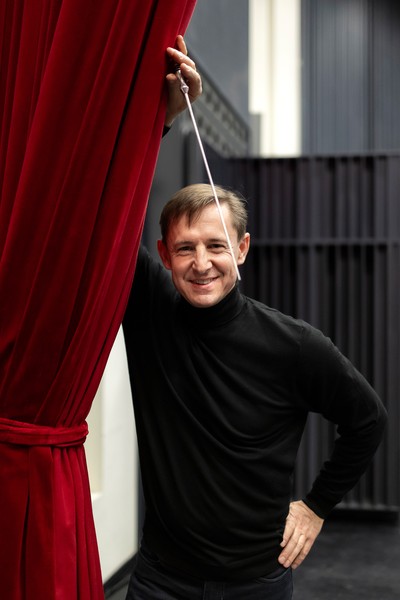
Dominik Sierzputowski fot. Tomasz Czachorowski/eventphoto.com.pl dla UMWKP
Which project are you particularly proud of?
In December 2021, I gave a concert with the Polish Army Orchestra in Cassino in the Italian Republic. At the time, I became interested in the history of the Second Polish Corps and General Władysław Anders. I thought it would be worthwhile to create a musical story about the fate of this Polish formation based on the accounts of veterans who were still alive. I commissioned a nine-part suite from Piotr Flis, a composer associated with brass bands and conductor of the Polish Army Orchestra in Szczecin. I created a script for a music-documentary film and began recording the accounts of witnesses to the wartime fate of the Polish Second Corps. Many of them lived permanently abroad. The result of my three years of work is an eighty-minute music-documentary film with fictional elements and a historical reconstruction of the battle. Piotr Flis created the film suite for large wind orchestra, soprano, children’s choir and women’s choir. The soundtrack was recorded with the Bydgoszcz military orchestra, the solo parts were sung by Edyta Krzemień and the choral parts by the ‘Canzona’ ensemble from Murowana Goślina. Due to the subject matter related to weapons, the composition was performed by a brass band. The premiere of the film directed by me, created under my musical direction and produced with the support of the regional government, the Music Academy in Bydgoszcz and the Ministry of National Defence, took place in Cassino, Italy, on the 80th anniversary of the victorious Battle of Monte Cassino – 18 May 2024.
What are the future plans of the orchestra under your leadership?
This year marks the seventy-fifth anniversary of our ensemble. It is a good time to take stock of achievements and to chart a course for the future. As part of the anniversary celebrations, there will be a series of concerts in various line-ups with a diverse repertoire. We have planned the main celebrations for 20 November 2025. A composition written especially for our jubilee by our university’s honorary doctorate, Jerzy Maksymiuk, will be performed in the concert hall of the Academy of Music’s newly constructed campus building. The event will be another opportunity to collaborate with musicians from the music academy in Bydgoszcz.

